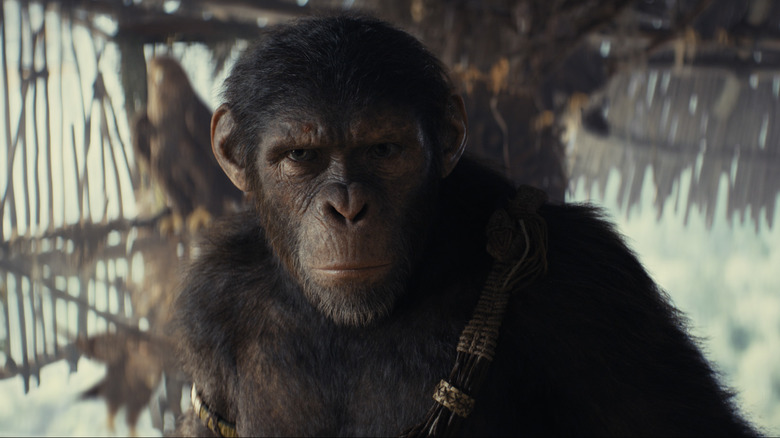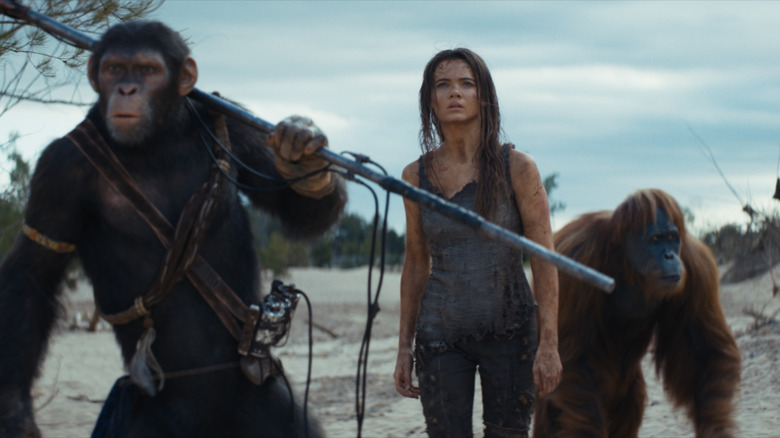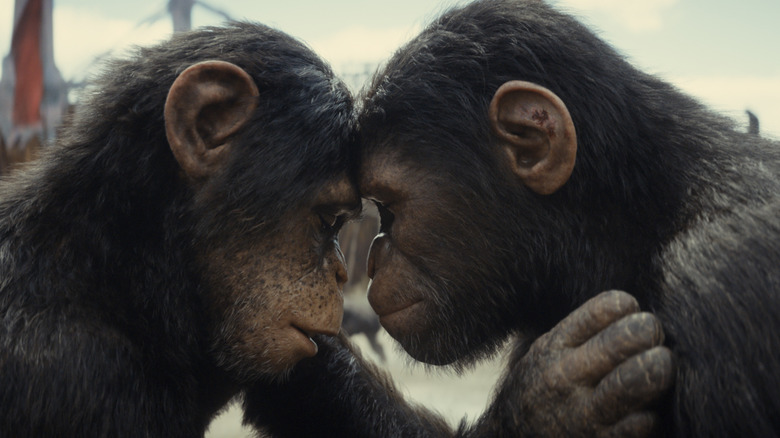Kingdom Of The Planet Of The Apes Review: Stunning Action But Monkeys Around Too Much
- Remarkable effects work bringing the apes to life
- Intense, harrowing action set pieces
- Story doesn't feel deep or thrilling enough to warrant the runtime
Wes Ball, the director of the first new entry in the modern "Planet of the Apes" franchise since Disney acquired 20th Century Fox in 2019, had some big shoes to fill. With "Dawn of the Planet of the Apes" and "War for the Planet of the Apes" helmer Matt Reeves already promised to "The Batman 2," Ball had the unenviable task of continuing a sci-fi action series that had largely shed its pulpier origins for a more prestigious approach to the material. That means simply delivering ape-on-ape violence will not be enough to sate viewers fond of the brand's current direction. The palate hungers for something more substantive thematically.
"Kingdom of the Planet of the Apes" largely succeeds by that metric. Despite carrying over absolutely zero characters from the last two films, this new outing seamlessly feels of a piece with what has come before it. It is a film equally concerned with spectacle and difficult questions about humanity. But in carrying the torch for the previous trilogy, this new film ends up running laps on the same track.
A decade ago, making earnest, gravitas-drenched action-drama prequels filling in the blanks of "Planet of the Apes" lore was a novel idea. But now that audiences might be open to moving further into the timeline, the new trilogy "Kingdom" sets up seems content to relitigate the human-ape relations of the last two films.
Whose world is it anyway?
Set a few centuries after the evolved ape Caesar's (Andy Serkis) heroic sacrifice at the end of "War for the Planet of the Apes," "Kingdom of the Planet of the Apes" exists at a post-apocalyptic midway point that's distant enough from the last trilogy to imply proximity to the futuristic setting of the original film, but not close enough to alienate anyone who preferred the tone of Matt Reeves' outings. Humans appear to have become a scarcer, less loquacious populace, while there's been significant fragmentation in the ape community.
Noa (Owen Teague) is a young member of the Eagle Clan, a small village of apes who catch, raise, and train eagles as part of their culture. When we meet Noa, he is embarking on a seasonal ritual, claiming his own bird and growing into adulthood. But a chance encounter with feral human Mae (Freya Allan) and an invasion from the forces of Proximus Caesar (Kevin Durand) interrupt his provincial life and thrust him into the unknown. Principally, he has to reckon with the mysterious Caesar, his lost teachings, and the ways they have been perverted by Proximus and his ape followers.
Much of the action that ensues is of a different scale from what has come before it. Wes Ball has cited Mel Gibson's "Apocalypto" as a big inspiration for this film, which explains how much of the thrills in "Kingdom" come from apes sprinting through jungles and fighting in brutal, unadorned skirmishes. There's a patience and a sparseness to the pacing of the film's unfolding mysteries that will surely tax some viewers, but the approach is executed surprisingly well.
It's been a great year for Kong-sized spectacles after the surprisingly good "Godzilla x Kong: The New Empire," but the beauty in the depiction of primates in "Kingdom of the Planet of the Apes" is in the nuance and detail of their performances and emotional expressions. Sure, the action is thrilling, but the real magic is in the medium shots and close-ups that allow the viewer to luxuriate in the intricate work the film's VFX teams have done bringing these non-human characters to life. Mocap work has come a long way since even the cutting-edge "Rise of the Planet of the Apes," and the groundwork Serkis has laid in the last 20 years is paying dividends. The result is a film that feels more emotionally immersive than any similarly effects-heavy picture this side of the "Avatar" films. But as marvelous as the effects are, there are some issues with the ideas these techniques are used to explore.
Can apes and humans co-exist?
The central idea running through the first half of "Kingdom of the Planet of the Apes" surrounds the legacy of Caesar, positioning his tenets of coexistence in a way that makes him the Professor Xavier of the "Planet of the Apes" universe. His absence casts a long shadow, showing an ape society that devolves into either isolationism or fascism without the benefit of his teachings to draw from. But the second half seems comfortable framing humanity as more inherently villainous than one might imagine.
Reactions to "X-Men '97" suggest audiences are currently more primed to more radical political leanings in their speculative fiction than they have been in some time. Much like how that new animated series portrays Magneto's perspective as being more heroic, "Kingdom" only presents one human figure with anything resembling decency before heavily suggesting that initial veneer of goodness is little more than a feint. But we've just had three films in a row exploring this specific side of the "Apes" franchise. If it's really a planet of the apes, at some point, it's going to have to be a film that exists in the space of the original film. Yet another trilogy that delays that inevitable payoff with more navel-gazing about whether the two species can exist doesn't seem nearly as daring. It's not that these ideas aren't interesting, but rather that "Kingdom" doesn't seem to have much new to say that "Dawn of the Planet of the Apes" and "War for the Planet of the Apes" haven't already said more eloquently and effectively.
The craft is there. The new characters are solid enough. Visually it's a real treat to behold. But 145 minutes is too long to spend retreading the recent past. If this is to be a new trilogy, the next two chapters need to cover some serious ground to get more distance from Caesar. A whole "planet" is the core word of each of these titles. It's time to expand the scope.
"Kingdom of the Planet of the Apes" swings into theaters on May 10.


